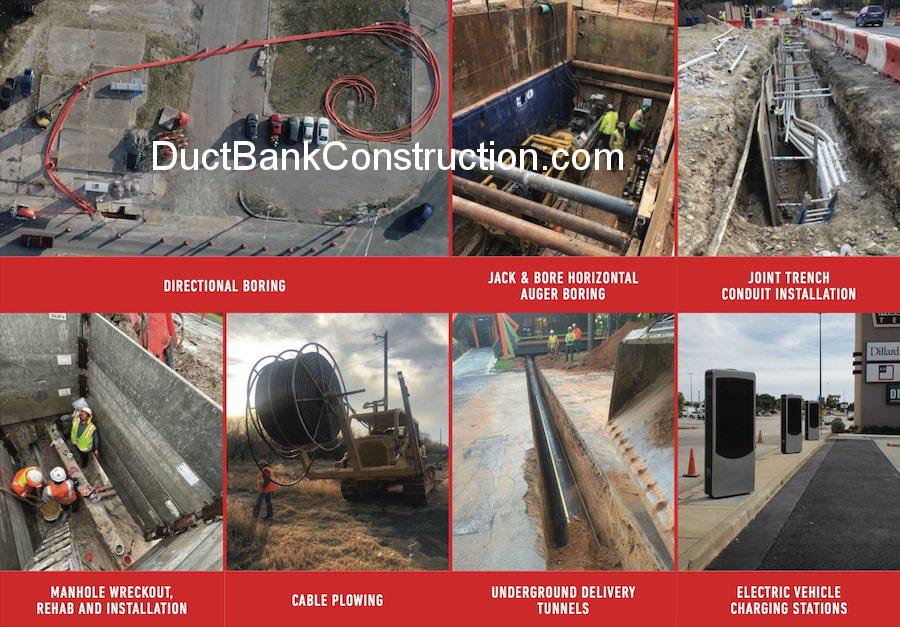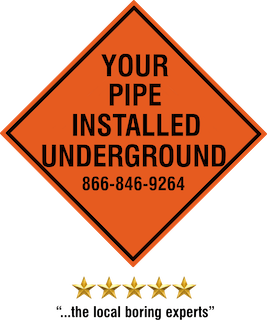Round Rock, Texas Duct Bank Construction
Round Rock, TX Construction Duct Bank Construction
Duct Bank Construction provides Round Rock, TX with underground utility and infrastructure construction services via tunnel construction services, horizontal auger boring and (HDD) horizontal directional drilling more commonly called directional boring.
We provide underground utility construction services specializing in the underground boring of utility pipelines for satellite, cable, TV, Internet, wi-fi, fiber optic, security, electric power, solar, wind, telephone, oil, gas, petroleum, steam, sewer, drain, water and irrigation crossings.
Our Round Rock, TX directional boring experts excavate an opening beneath the ground without disturbing the surface to bore underground pipes and conduit for utility lines of all types of lengths and diameters whether large or small.
From electrical to fiber optic lines, sewer lines and water mains, to oil and gas pipelines our Round Rock, TX boring crew uses directional boring techniques to place HDPE, PVC and steel pipe, conduit and cables under almost any surface like concrete slabs, driveways, roadways, sidewalks and walkways in diverse terrains like dirt, clay, cobblestone, rock and even sand.
We have 25+ years of directional drilling experience and have bored and installed utility pipelines under trees, under city roads, under bridges, under railway tracks and even under rivers.
Round Rock, TX Drilling and Duct Bank Construction
We utilize state of the art horizontal directional drilling (HDD) machines and experienced drilling crews for commercial, residential and municipal underground pipe installation projects in Round Rock, TX and the surrounding area.
Most directional boring machines use drilling fluid while a few machines are designed to use either air or air and foam. Air & foam machines are used for drilling in rock. Directional drilling fluid is generally a mixture of bentonite clay and water, with additives used to improve borehole performance. In softer soils the jet of fluid cuts through the soil, with the cuttings suspended in the drilling fluid. As drilling fluid is pumped down the hole the cuttings are carried back out to the surface where they are either allowed to settle out in a pit or removed mechanically in a mud cleaning system. Drilling fluid (mud) is classified as non-toxic and can be disposed of accordingly.
Upon reaching the exit point, the drill bit is detached and the end of the drill pipe is attached to a back reamer or hole opener (for rock), if the borehole must be enlarged. The back reamer is pulled back while rotating the drill pipe to enlarge the borehole with as many consecutive passes as are needed. Drill pipe is added behind the reamer or hole opener so that there is always drill pipe in the borehole.
When the borehole is between 25% - 50% larger than the pipe to be installed, the end of the drill pipe is connected to a back reamer which is attached to a swivel which is then connected to the utility product pipe. Drilling fluid is pumped downhole to provide lubrication and the utility product pipe is pulled in while rotating the drill pipe & reamer. The swivel prevents rotation of the utility product pipe while pulling it back.
For some power, cable and telecommunications projects, the drill pipe itself becomes the conduit and is left in the ground upon reaching the exit point. This type of product pipe drilling installation is known as “drill and leave”.
Once the utility product pipe is installed, the exit and entry points are excavated if necessary and connections are made as needed.
Directional boring is used in place of other underground utility product pipe installation techniques in Round Rock, TX for the following reasons:
Lower cost
Directional capabilities
No access pit required
Shorter project completion times
Less traffic disruption
Deeper product pipe installation possible
Longer product pipe length installation possible
Safer for the environment
Round Rock, TX Underground Duct Bank Construction
Underground boring is a trenchless method of installing pipes below the surface along a predetermined path. This system allows for the successful placement of utility pipe and conduit underground without disturbing the ground surface. With underground boring, crossing obstacles in Round Rock, TX like sidewalks, driveways, parking lots and existing landscaping becomes easier.
Using traditional methods of installing underground pipes, a trench would have to be cut into the ground the full length of the product pipe. Concrete pavement would need to be cut and landscaping damaged to gain access to the product pipe’s route, sending the project’s cost upward.
Underground boring can be used in a wide variety of conditions but is not the optimal installation method in all conditions. The most difficult ground formation for underground boring is unconsolidated soils like cobblestone. In some cases the un-consolidated soils can be grouted and then bored. Underground boring can be used for sanitary sewers but only when ground conditions permit a straight bore path.
The Advantages Of Underground Boring Compared to Open Cut Excavation
Preserves the integrity of the existing landscape.
Utility pipes can be installed in curved or straight lines to avoid underground obstacles.
The process is much quicker than open cut excavation and requires fewer workers, making it less expensive in most cases.
Underground boring can be used to drill underneath roads, buildings and even waterways.
Underground boring is a less noisy and more environmentally friendly process than open cut excavation.
Round Rock, TX Road Duct Bank Construction
We have bored telecommunications & power cable conduits, water lines, sewer lines, gas lines, oil lines, product pipelines and environmental remediation casings from 2” to 48” in size via directional drilling (HDD) under city, county and state roads.
In addition to directional drilling, a variety of other methods - slick bore, dry bore, jack and bore, hammering, bentonite boring, rotary drilling, wet boring, mud jacking, slurry boring, and rotary boring - can be used describe methods for boring underneath roads in Round Rock, TX.
How Does Directional Road Boring Work?
Drill A Pilot Hole Underneath the Road
After the drill site has been prepped, a horizontal boring machine is moved into place and a bore head is connected to drill pipe that enters the ground at an angle. As the bore head drills a pilot hole, additional drill pipe sections are added until the pilot hole is completed under the road.
Pilot Hole Back Reamed and Enlarged For New Product Pipe
After the boring head exits at the intended location on the other side of the road, a back reamer is attached. Once attached, the back or “pre-reamer” is pulled back through the borehole clearing soil and even rocks to expand the hole to a size that is 25% -50% larger than the product pipe that is to be pulled and installed.
New Product Pipe Is Pulled Back Under the Road
After the borehole has been prepared, a new product pipe is pulled through the borehole opening created under the road. Once the pipe is successfully in place, the ends of the new utility line are connected and the road-boring project is completed.
Round Rock, TX Call Now!
Our team having completed thousands of horizontal directional drilling projects through HDD boring, horizontal auger boring and conventional tunneling means we can successfully bring your next Round Rock, TX underground subsurface construction project in on time and within budget.
Round Rock, TX Boring Company | Round Rock, TX Auger Boring Companies | Round Rock, TX Directional Boring | Round Rock, TX Utility Crossings | Round Rock, TX HDD | Round Rock, TX Horizontal Directional Drilling | Round Rock, TX Trenchless | Round Rock, TX Underground Construction
Our services in the city of Round Rock, TX are categorized under the following codes:
NAICS Code 238910 Boring, for building construction NAICS Codes 237990 Horizontal Directional Drilling (underground cable, pipeline, sewer/water installation)
CSI Code: Common Work Results for Utilities –
33 05 23.13 Utility Horizontal Directional Drilling
33 05 23 Trenchless Utility Installation
33 05 23.13 Utility Horizontal Directional Drilling
33 05 23.16 Utility Pipe Jacking
33 05 23.19 Microtunneling
33 05 23.23 Utility Pipe Ramming
33 05 23.26 Utility Impact Moling
31 71 19 Tunnel Excavation by Tunnel Boring Machine
41 33 16 Boring Equipment
© 2017 Best Boring Company, LLC
Pulling For You ™


